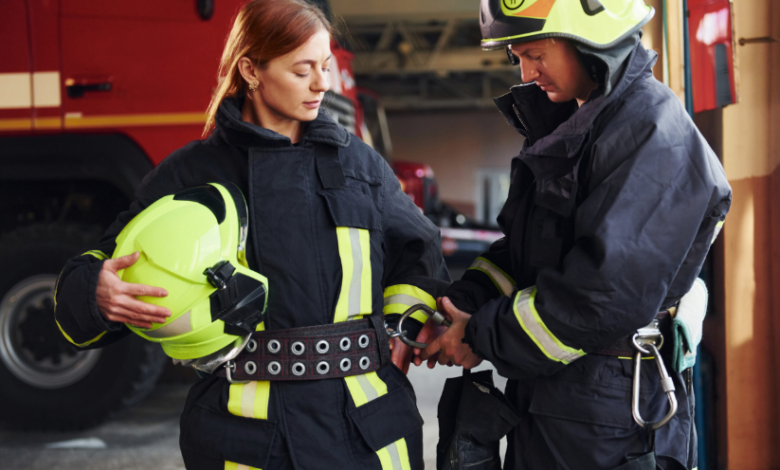The Role of Peer Support in Depression Treatment for First Responders

Every single day, dedicated professionals are willing to risk their lives to serve the public as first responders, firefighters, police officers, paramedics, and emergency dispatchers. Each one of these professionals faces high-stress situations that most of the population would not ever encounter. The cumulative impact of repeated exposure to dangerous situations, loss, and trauma is profound. While a large part of the job is about being brave and resilient, the mental strain of the job most notably, depression is not visible beneath the uniform.
There is a high likelihood that those who serve their communities do so while miserable. Stigma, perceived weakness, and not knowing who to speak to are the most common reasons. Luckily, depression treatment for first responders has progressed, and the healing value of peer support is now recognized.
The Mental Workload of First Responders
Dealing with tragedy is part of the job description for first responders. They are the first to arrive at chaotic scenes, provide critical care, and have to deal with death and human suffering. The cumulative impact of these intense demands can lead to chronic and overwhelming stress that, if not addressed, can result in anxiety, substance use, and eventually, PTSD.
It can take a while to feel the effects of a job emotionally. Many people experience symptoms like sleep difficulty, irritability, lack of focus, low mood, emotional numbness, guilt, shame, overwhelm, disconnection, and feelings of depression. All of these feelings can affect your relationships, your ability to perform your job, and your overall health and well-being.
Cultural norms within their profession often make this population reluctant to ask for help. It seems like asking for help is breaking a taboo of strength. In this case, peer support can be a helpful bridge between silence and treatment.
The True Meaning of Peer Support
Listeners who are peers are not just colleagues. Peer support means caring for someone who has been through a similar experience in an organized, intentional, and confidential way. When it comes to depression treatment for first responders, it helps to reinforce supportive attitudes around mental health and provides empathetic, practical support from someone who “gets it.”
Unlike mental health therapy, support from a peer does not require clinical training. However, it does require a sense of empathy, experience, and trust – all of which are sometimes difficult to find outside the first responder environment. A peer supporter knows the emotional aftermath that follows a difficult and disturbing call, the anger and frustration of failing a system, and the complex challenge of going home and pretending everything is alright.
Incorporated into formal mental health programs, peer support enhances the therapy and medication components by providing real-time encouragement and accountability.
See also: How Car Accident Lawyers Handle Cases Involving Uninsured or Underinsured Drivers
The Impact of Peer Support on Depression Recovery
Perhaps the strongest attribute of peer support is its ability to break the paralyzing sense of isolation that often accompanies depression. For first responders with mental health challenges, connecting with a peer listener helps to overcome that sense of isolation and fosters a sense of hope.
Support from peers helps break down stigma. Many first responders think they must sacrifice their mental health for their career. There is a common fear that seeking help might affect someone’s job or reputation. A peer supporter can help ease those concerns from firsthand experience and show that healing is possible and that seeking help is a sign of strength.
In addition, peers help recognize warning signs that someone outside the situation might overlook. They often first notice changes in someone’s mood, behavior, or performance. With the right training, peer supporters can help their colleagues and encourage them to seek professional help before things worsen.
The Evolution of Peer Support in First Responder Culture
In the early days, first responders did not talk about their mental health. Emotional issues were kept hidden and unaddressed, which sometimes ended in tragedy. Over time, this culture has started to change. More and more departments around the country recognize the value of mental health and the importance of peer support. These support teams have become a vital part of the department’s overall mental health strategy.
These programs provide trained crisis responders with training in active listening and psychological first aid. As a peer supporter, they will help someone in distress rationally and respectfully. They learn to shield someone from the impact of a crisis and maintain a confident and listening presence while helping them get the clinical help they need.
By employing this method, we have been able to lower suicide rates, uplift spirits, and cultivate more positive workplace surroundings. First responders have been provided with the tools and the vocabulary necessary to assist each other during tough periods.
Merging Peer Support with Clinical Treatment
Healing from depression requires a multi-dimensional strategy. While the importance of peer support cannot be overstated, it is most effective when combined with clinically appropriate treatment. Peer support should be integrated but not wholly replace therapy or medical care.
Clinically trained mental health professionals possess the skills to evaluate the gravity of a person’s depression, design an individualized treatment course, and deliver interventions that peers cannot provide. These interventions may consist of cognitive behavioral therapy, hypnotherapy, psychotropic medications, and trauma-focused therapy. Peers help sustain momentum between sessions, check in regularly, and reinforce positive coping strategies.
In structured programs for depression treatment in first responders, clinical and peer support teams frequently pair up. This alignment aids in the provision of seamless care and assists in bridging the distance between clinical understanding and lived experience.
Building Trust Through Shared Experience
When first responders talk about their pain, they especially don’t want people to understand, judging, or suggest that to “just take time off”. But when they meet their peers who understand, going through the same experience, a shift takes place, and they form a sense of attachment and feel they are not alone.
This connection builds trust and enables conversations that can take place in the safe, supportive environments that peer supporters offer. It allows people to voice their feelings, be it shame or depression, and re-establish that fractured bond of companionship that depression can take away.
A peer supporter does not need to fix everything; their mere presence and willingness to commune in suffering can deeply complement depression treatment for first responders, offering a healing element that many overlook.
The Role of Training and Supervision
Each of the peer supporters offered can be a source of emotional, social, or even spiritual drain if not given proper training. Providing the needed training allows the supporters to understand their sphere of influence.
Effective peer support programs include ongoing learning opportunities, supervision, and emotional support for peer supporters themselves. After all, these individuals are also at risk of burnout and need resources to stay emotionally healthy. When properly supported, they can remain grounded, compassionate, and effective in their roles.
Quality programs also emphasize boundaries. Peer support is not therapy, and supporters must refer their colleagues to clinical professionals when necessary. This collaboration creates a safety net and prevents further harm.
Reducing Stigma Across the Ranks
Changing the conversation related to depression and mental health for first responders is one of the long-term goals for peer support. When peer support programs are visible and normalized, it sends a message that it’s okay to talk about feelings, to ask for help, and to prioritize mental health.
Over time, this culture shift saves lives. It empowers people to speak up early instead of waiting for a crisis. It opens the door for meaningful conversations during roll call or after tough incidents. It shows that being human is not a liability—it’s a strength.
Leadership is important in this change. When leaders and supervisors support and engage in peer support programs, it shows that every level of the organization values mental health. It also ensures that new employees join the profession with a more positive and supportive attitude.
Motivating First Responders to Seek Help
A significant number of first responders continue to remain reluctant to access peer or clinical services. They may be concerned with confidentiality, fear of putting more weight on the shoulders of supporters, or feeling inadequate. The discussion around help-seeking is to be encouraged and positioned as a strong professional attribute instead of a personal weakness.
Outreach should be tireless and empathetic, incorporate education, anonymous materials, and private peer-to-peer dialogue. The message should be clear, concise, and properly repeated: “It is okay not to be okay. It is okay to seek help”.
When mental health professionals and departments join forces, no one falls through the cracks. A comprehensive safety net, including early intervention, ongoing peer support, and professional therapy, helps to guide those in distress and assists in stabilizing them.
Final Thoughts
Emotionally, the job of a first responder takes a toll and remains unaccounted for. Depression is not a personal flaw; it is an effect of stress, trauma, and prolonged emotional discomfort. It takes a great deal of support, dedication, and sheer will to confront.
After professional mental health care, peer support programs become an important component of the depression recovery process for first responders. They understand and provide a sense of connection and hope for those who have experienced the same challenges.
At First Responders of California, we understand the toll serving others takes when you yourself are suffering. That is why we have developed programs that simultaneously support your recovery and respect the magnitude of your service. You are not alone, and there is hope to work towards.







